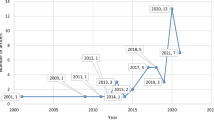Abstract—
The methodological foundations of using information technologies in management are developed; a managerial competency model is created; criteria and indicators for assessing how prepared a manager is to conditions of digitalization are studied. Professional managerial education (university-level and post-university-level) within digital professional education is considered.



Similar content being viewed by others
Notes
Crowdsourcing is understood as involvement of a wide range of people in solving certain problems of innovative production activities in order to utilize their creative abilities.
Actors are information flow connections between individuals who in some way participate in the communication process. Networks do not consider individuals as such, but rather their social relationships.
SWOT analysis is a method of strategic planning that consists of identifying factors of the organization’s internal and external environments and sorting them into four categories: Strengths, Weaknesses, Opportunities, Threats.
REFERENCES
Taylor, F.W., The Principles of Scientific Management, Harper, 1911.
Mayo, E., The Social Problems of an Industrial Civilization, New Hampshire: Ayer, 1945.
Fayol, H., Emerson, H., and Ford, H., Upravlenie—eto nauka i iskusstvo (Management as a Science and Art), Moscow: Respublika, 1992.
Thomson, K., The Employee Revolution: Rise of Corporate Internal Marketing, Prentice Hall, 1990.
Drucker, P.F., The Effective Executive, New York: Harper & Row, 1967.
Strebel, P. and Olsson, A.-V., Smart Big Moves: The Story Behind Strategic Breakthroughs, Pearson Education, 2008.
Vitke, N.A., Organizatsiya upravleniya i industrial’noe razvitie (ocherki po sotsiologii nauchnoi organizatsii truda i upravleniya) (Management Organization and Industrial Development (Essays on the Sociology of the Scientific Organization of Labor and Management)), Moscow: NKRKI SSSR, 1925, 2nd ed.
Dunaevskii, F.R., Professional’nyi podbor i ego sotsial’nyi smysl: Metodologiya professional’nogo podbora (Professional Selection and Its Social Meaning: Methodology of Professional Selection), Kharkov: Put’ Prosveshcheniya: Inst. Tr., 1923.
Gastev, A.K., Kak nado rabotat' (How to Do Work), Moscow: Izd. Dom Ekon., 1972.
Toshchenko, Zh.T., Sotsiologiya zhizni (Sociology of Life), Moscow: YuNITI, 2016.
Yadov, V.A., Strategiya sotsiologicheskogo issledovaniya (Sociological Research Strategy), Moscow: Akademkniga Dobrosvet, 2003.
Prigozhin, A.I., Metody razvitiya organizatsii (Methods of Development of Organizations), Moscow: MTsFER, 2003.
Vesnin, V.R., Sovremennye metody strategicheskogo analiza (Modern Methods of Strategic Analysis), Moscow: MESI, 2013.
Magura, M.I. and Kurbatova, M.B., Sekrety motivatsii ili motivatsiya bez sekretov (Secrets of Motivation or Motivation without Secrets), Moscow: Izd. Zh. Upr. Personalom, 2007.
Kudryavtseva, E.I., Assessment and development of the management potential of the personnel of organizations: Methodology, theory, and practice, Extended Abstract of Doctoral (Econ.) Dissertation, Moscow, 2015.
Dolzhenko, R.A. and Bakalenko, A.V., Crowdsourcing as a tool for mobilizing intellectual resources: The experience of use in Sberbank of Russia, Ross. Zh. Menedzh., 2016, vol. 14, no. 3, pp. 77–102.
Veselov, Yu.V. and Lipatov, A.A., Trust in the organization: Methodological foundations of research in economics, sociology, and management, Ross. Zh. Menedzh., 2015, vol. 13, no. 4, pp. 85–104.
Martin, J.A. and Eisenhardt, K.M., Rewiring: Ross-business-unit collaborations in multibusiness organizations, Acad. Manage. J., 2010, vol. 53, no. 2, pp. 265–301.
Tagliaventi, M.R., The role of networks of practice, value sharing, and operational proximity in knowledge flows between professional groups, Hum. Relat., 2006, vol. 59, no. 3, pp. 291–319.
Mayfield, J., Mayfield, M., and Sharbrough, W.C., Strategic vision and values in top leaders' communications: Motivating language at a higher level, Int. J. Bus. Commun., 2015, vol. 52, no. 1, pp. 97–121.
Hamrin, S.B.A., Communicative leader ship: Exploring leaders’ discourse on participation and engagement, Comun. Soc., 2016, vol. 38, no. 2, pp. 7–42.
Tichy, N.M., Tushman, M.L., and Fombrun, C., Social network analysis for organizations, Acad. Manage. Rev., 1979, vol. 4, no. 4, pp. 507–519.
Bersin, J., What Emails Reveal about Your Performance at Work, 2018. https://joshbersin.com/2018/10/ what-emails-reveal-about-your-performance-at-work/. Accessed December 25, 2018.
Titov, S.A., Investigation of the relationship between the structure of intra-project communications and the effectiveness of innovative projects through the analysis of social networks, Cloud Sci., 2014, vol. 1, no. 4, pp. 665–695.
Mal'tseva, D.V., The network approach as a phenomenon of sociological theory, Sotsiol. Issled., 2018, no. 4, pp. 3–14.
Kudryavtseva, E.I. and Volkova, N.V., The role of network communication activity in the formation of the project team, Ross. Zh. Menedzh., 2019, vol. 17, no. 1, pp. 47–70.
Author information
Authors and Affiliations
Corresponding authors
Ethics declarations
The authors declare that they have no conflicts of interest.
Additional information
Translated by A. Ovchinnikova
About this article
Cite this article
Antropova, L.V., Shreider, N.V. IT Methodology in HR Management in Regard to Digital Professional Education. Autom. Doc. Math. Linguist. 54, 10–20 (2020). https://doi.org/10.3103/S0005105520010069
Received:
Published:
Issue Date:
DOI: https://doi.org/10.3103/S0005105520010069




